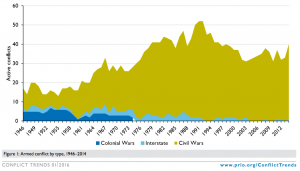I don’t like to talk to people at the gym. My goal is to work out, get out, and get on with my day. But recently, I made an exception when I saw this man and his anti-UN shirt. Meet Eric. He believes the US pays far more toward the UN than we get back in benefits. He thinks the headquarters brings New York little but unpaid traffic tickets and should be moved to Brussels.

If you had a stereotype of an anti-UN activist, Eric probably doesn’t match it: he’s articulate, well educated, and well traveled. He’s also a nice guy (and consented to my use of his photo). I’ve also got well educated friends who believe that the organization has mostly failed and that UN peacekeeping missions have been nothing but disasters (citing Bosnia and Rwanda in the 1990s).
So let me clear a few things up. First, the UN was created to prevent international war–see articles 2.3 and 2.4 of the UN Charter. In fact, since the UN’s founding in 1945, purely interstate war has  fallen to nearly none (see the light blue in this chart)–a remarkable success. Most wars going on now are civil wars, and the Charter expressly forbids intervention “in matters which are essentially within the domestic jurisdiction of any state” (article 2.7), making civil wars tricky to stop.
fallen to nearly none (see the light blue in this chart)–a remarkable success. Most wars going on now are civil wars, and the Charter expressly forbids intervention “in matters which are essentially within the domestic jurisdiction of any state” (article 2.7), making civil wars tricky to stop.
Second, UN peacekeeping is mostly successful. Research shows “peacekeeping cuts the risk of renewed war by 75-85%.” Yes, the Srebrenica massacre and Rwandan genocide were catastrophic failures (due to insufficient mandates and resources), but these were followed by the soul-searching Brahimi report and major reforms.
Third, even in civil wars, the UN is pretty effective when the five permanent, veto-wielding members of the Security Council (US, UK, France, Russia, China) can agree enough on what to do (a big “if”). The UN Office of Political Affairs and special envoys mediate many conflicts. When the country in question consents to it (another big if), “multidimensional peace operations” strengthen peace processes through a combination of peacekeeping, “good offices” (mediation and informal conciliation), capacity building of key institutions, economic development, and other peacebuilding. Countries such as Cambodia, Namibia, Mozambique, Liberia, and East Timor have achieved sustained peace with the help of UN peace operations. Look, too, at the remarkable decline in civil wars (in the chart above) during an all-too-brief golden age from about 1991 to 2003 when the Cold War was over and the permanent five were cooperating.
The dysfunctional structure of the Security Council is a major impediment to greater peacemaking success by the UN: any one of the P5 can block action. This rendered the UN nearly helpless during the Cold War; now, with renewed antagonism between Russia and the West, paralysis is setting in again (the Syrian civil war being one tragic result). There are proposals for Security Council reform, but it is hard to imagine any one of the P5 giving up its veto. After all, one of my best arguments to put to Eric is that the UN can’t do much of anything the US doesn’t want it to do.
Still, it is in the interests of the United States–or any country–to have a functioning UN. The institution has (so far) prevented World War III and helped nearly end international war. To the extent it prevents and ends civil wars–which, overall, it has learned to do better, at least when the P5 are aligned–Americans are better off. Civil wars generate refugees (leading to border crises and political tensions here), breed terrorism, encourage dictators, and reverse economic growth. Warts and all, we need the UN.
Many thanks, Suzanne, for an excellent piece as well as lesson on how to address a potential conflict. I’ve had to entertain similar differences as well, not only about the UN but also the WTO, NAFTA, NATO, etc. Having had to work with the UN on many occasions, I can attest to its frustrations and interminable bureaucracy, complaints, by the way, which nearly all governments make about it.
But for some reason, few people in the US are willing to explain and defend it and America’s overall interest in advancing international order and the rule of law. Yours was a marvelous defense of an institution that more than any other seeks to advance international order and peace and one whose founding and organization the US led. It is unquestionably imperfect and doesn’t always reflect our own interests or views. But it has more than amply served its purpose and also American interests.
And my compliments to Eric as well for his interest in listening to another point of view. Listening is always constructive.
Thanks for the lesson on diplomacy.
Gary
Thanks for your thoughts Gary. Yes I too have heard complaints of UN bureaucracy and inefficiency (just couldn’t fit that in my self-imposed 600-word limit). But it’s gratifying to read your affirmations of my overall points.